HR's Organizational Objectives and Ethical Management Report
VerifiedAdded on 2022/08/01
|6
|2234
|412
Report
AI Summary
This report delves into the crucial role of Human Resources Management (HRM) within organizations, focusing on the core objectives and their evolution in contemporary business environments. It outlines key HRM functions such as recruitment, compensation, and employee relations, emphasizing the importance of building organizational capability through aligning people, systems, and culture. The report highlights the evolution of HR from traditional roles to strategic partners, addressing issues like standardization and ethical practices. It underscores the significance of professional, ethical, and just HR management, referencing the CIPD’s Code of Professional Conduct to ensure integrity and protect employee rights. The report also covers the changing landscape of HR objectives, reflecting the need for adaptation in response to both internal and external forces, and concludes by emphasizing the importance of ethical practices in fostering a positive work environment and attracting customers.
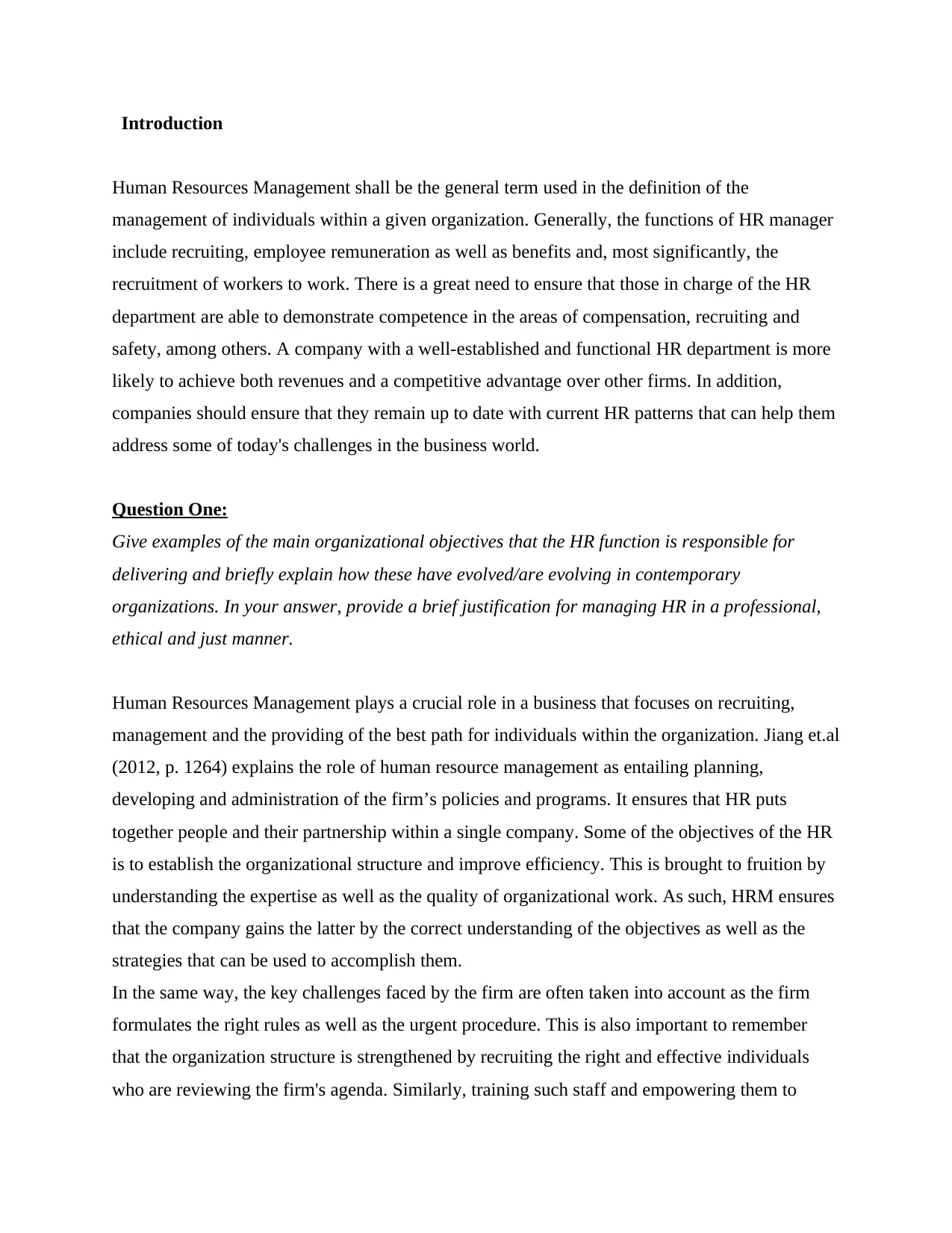
Introduction
Human Resources Management shall be the general term used in the definition of the
management of individuals within a given organization. Generally, the functions of HR manager
include recruiting, employee remuneration as well as benefits and, most significantly, the
recruitment of workers to work. There is a great need to ensure that those in charge of the HR
department are able to demonstrate competence in the areas of compensation, recruiting and
safety, among others. A company with a well-established and functional HR department is more
likely to achieve both revenues and a competitive advantage over other firms. In addition,
companies should ensure that they remain up to date with current HR patterns that can help them
address some of today's challenges in the business world.
Question One:
Give examples of the main organizational objectives that the HR function is responsible for
delivering and briefly explain how these have evolved/are evolving in contemporary
organizations. In your answer, provide a brief justification for managing HR in a professional,
ethical and just manner.
Human Resources Management plays a crucial role in a business that focuses on recruiting,
management and the providing of the best path for individuals within the organization. Jiang et.al
(2012, p. 1264) explains the role of human resource management as entailing planning,
developing and administration of the firm’s policies and programs. It ensures that HR puts
together people and their partnership within a single company. Some of the objectives of the HR
is to establish the organizational structure and improve efficiency. This is brought to fruition by
understanding the expertise as well as the quality of organizational work. As such, HRM ensures
that the company gains the latter by the correct understanding of the objectives as well as the
strategies that can be used to accomplish them.
In the same way, the key challenges faced by the firm are often taken into account as the firm
formulates the right rules as well as the urgent procedure. This is also important to remember
that the organization structure is strengthened by recruiting the right and effective individuals
who are reviewing the firm's agenda. Similarly, training such staff and empowering them to
Human Resources Management shall be the general term used in the definition of the
management of individuals within a given organization. Generally, the functions of HR manager
include recruiting, employee remuneration as well as benefits and, most significantly, the
recruitment of workers to work. There is a great need to ensure that those in charge of the HR
department are able to demonstrate competence in the areas of compensation, recruiting and
safety, among others. A company with a well-established and functional HR department is more
likely to achieve both revenues and a competitive advantage over other firms. In addition,
companies should ensure that they remain up to date with current HR patterns that can help them
address some of today's challenges in the business world.
Question One:
Give examples of the main organizational objectives that the HR function is responsible for
delivering and briefly explain how these have evolved/are evolving in contemporary
organizations. In your answer, provide a brief justification for managing HR in a professional,
ethical and just manner.
Human Resources Management plays a crucial role in a business that focuses on recruiting,
management and the providing of the best path for individuals within the organization. Jiang et.al
(2012, p. 1264) explains the role of human resource management as entailing planning,
developing and administration of the firm’s policies and programs. It ensures that HR puts
together people and their partnership within a single company. Some of the objectives of the HR
is to establish the organizational structure and improve efficiency. This is brought to fruition by
understanding the expertise as well as the quality of organizational work. As such, HRM ensures
that the company gains the latter by the correct understanding of the objectives as well as the
strategies that can be used to accomplish them.
In the same way, the key challenges faced by the firm are often taken into account as the firm
formulates the right rules as well as the urgent procedure. This is also important to remember
that the organization structure is strengthened by recruiting the right and effective individuals
who are reviewing the firm's agenda. Similarly, training such staff and empowering them to
Paraphrase This Document
Need a fresh take? Get an instant paraphrase of this document with our AI Paraphraser
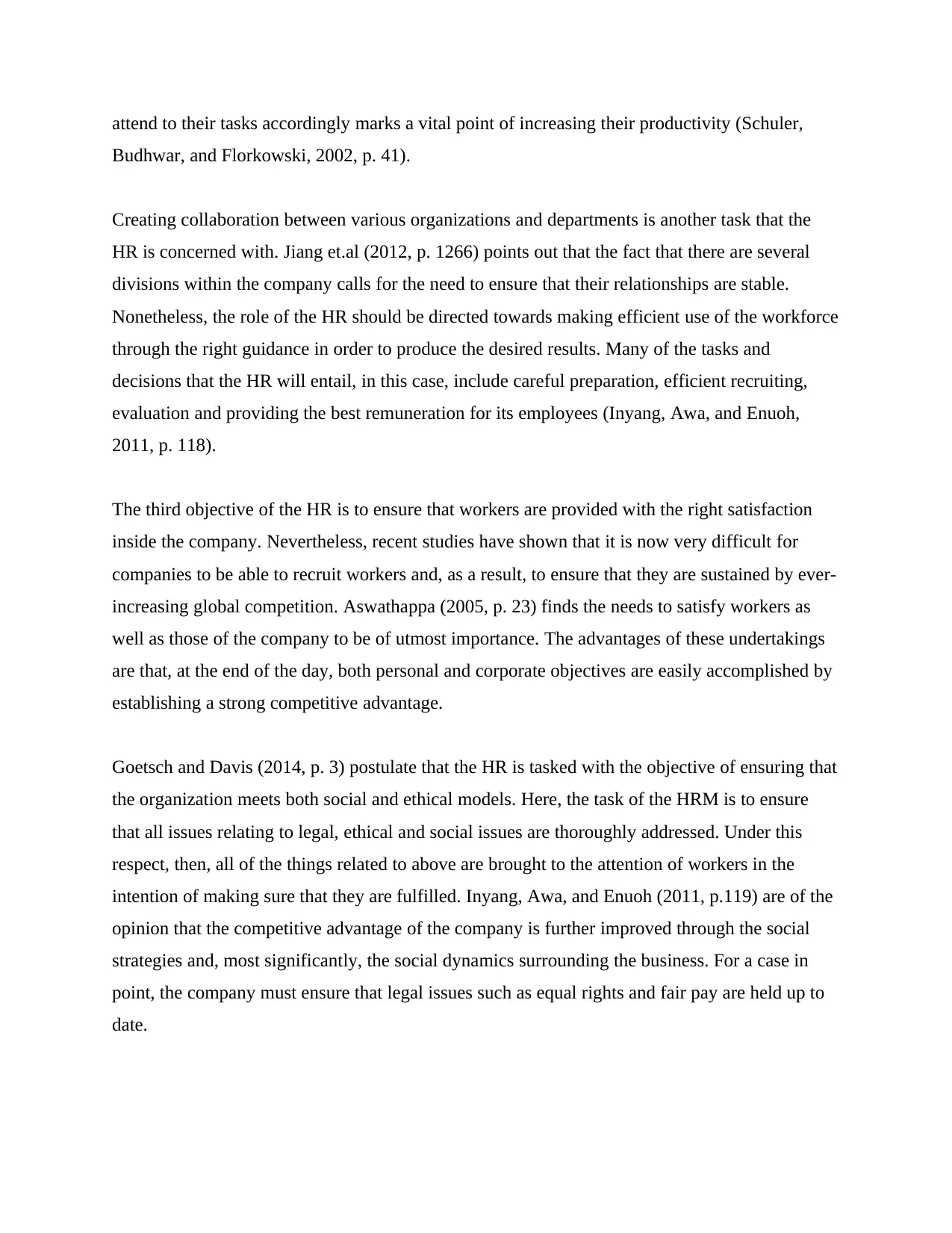
attend to their tasks accordingly marks a vital point of increasing their productivity (Schuler,
Budhwar, and Florkowski, 2002, p. 41).
Creating collaboration between various organizations and departments is another task that the
HR is concerned with. Jiang et.al (2012, p. 1266) points out that the fact that there are several
divisions within the company calls for the need to ensure that their relationships are stable.
Nonetheless, the role of the HR should be directed towards making efficient use of the workforce
through the right guidance in order to produce the desired results. Many of the tasks and
decisions that the HR will entail, in this case, include careful preparation, efficient recruiting,
evaluation and providing the best remuneration for its employees (Inyang, Awa, and Enuoh,
2011, p. 118).
The third objective of the HR is to ensure that workers are provided with the right satisfaction
inside the company. Nevertheless, recent studies have shown that it is now very difficult for
companies to be able to recruit workers and, as a result, to ensure that they are sustained by ever-
increasing global competition. Aswathappa (2005, p. 23) finds the needs to satisfy workers as
well as those of the company to be of utmost importance. The advantages of these undertakings
are that, at the end of the day, both personal and corporate objectives are easily accomplished by
establishing a strong competitive advantage.
Goetsch and Davis (2014, p. 3) postulate that the HR is tasked with the objective of ensuring that
the organization meets both social and ethical models. Here, the task of the HRM is to ensure
that all issues relating to legal, ethical and social issues are thoroughly addressed. Under this
respect, then, all of the things related to above are brought to the attention of workers in the
intention of making sure that they are fulfilled. Inyang, Awa, and Enuoh (2011, p.119) are of the
opinion that the competitive advantage of the company is further improved through the social
strategies and, most significantly, the social dynamics surrounding the business. For a case in
point, the company must ensure that legal issues such as equal rights and fair pay are held up to
date.
Budhwar, and Florkowski, 2002, p. 41).
Creating collaboration between various organizations and departments is another task that the
HR is concerned with. Jiang et.al (2012, p. 1266) points out that the fact that there are several
divisions within the company calls for the need to ensure that their relationships are stable.
Nonetheless, the role of the HR should be directed towards making efficient use of the workforce
through the right guidance in order to produce the desired results. Many of the tasks and
decisions that the HR will entail, in this case, include careful preparation, efficient recruiting,
evaluation and providing the best remuneration for its employees (Inyang, Awa, and Enuoh,
2011, p. 118).
The third objective of the HR is to ensure that workers are provided with the right satisfaction
inside the company. Nevertheless, recent studies have shown that it is now very difficult for
companies to be able to recruit workers and, as a result, to ensure that they are sustained by ever-
increasing global competition. Aswathappa (2005, p. 23) finds the needs to satisfy workers as
well as those of the company to be of utmost importance. The advantages of these undertakings
are that, at the end of the day, both personal and corporate objectives are easily accomplished by
establishing a strong competitive advantage.
Goetsch and Davis (2014, p. 3) postulate that the HR is tasked with the objective of ensuring that
the organization meets both social and ethical models. Here, the task of the HRM is to ensure
that all issues relating to legal, ethical and social issues are thoroughly addressed. Under this
respect, then, all of the things related to above are brought to the attention of workers in the
intention of making sure that they are fulfilled. Inyang, Awa, and Enuoh (2011, p.119) are of the
opinion that the competitive advantage of the company is further improved through the social
strategies and, most significantly, the social dynamics surrounding the business. For a case in
point, the company must ensure that legal issues such as equal rights and fair pay are held up to
date.
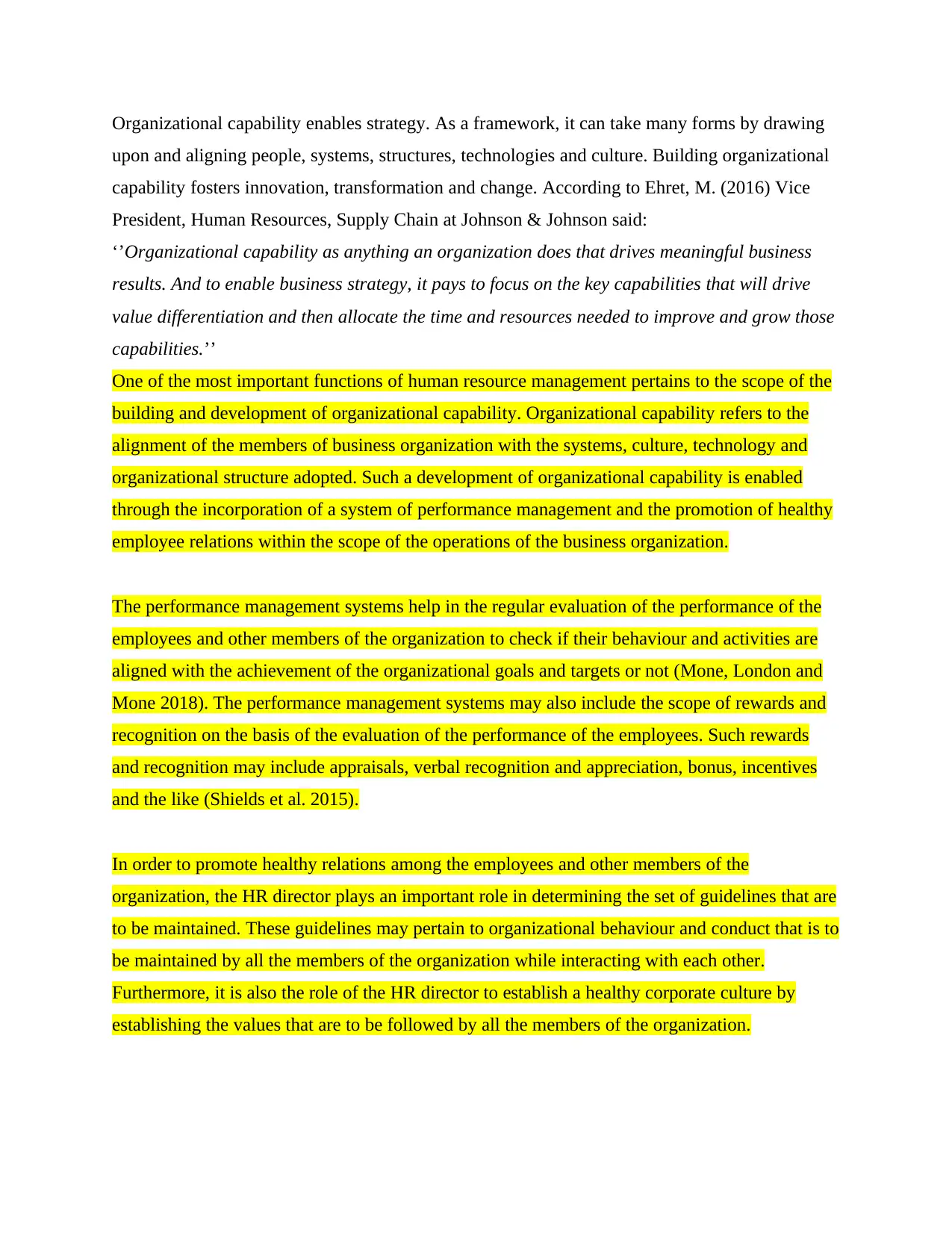
Organizational capability enables strategy. As a framework, it can take many forms by drawing
upon and aligning people, systems, structures, technologies and culture. Building organizational
capability fosters innovation, transformation and change. According to Ehret, M. (2016) Vice
President, Human Resources, Supply Chain at Johnson & Johnson said:
‘’Organizational capability as anything an organization does that drives meaningful business
results. And to enable business strategy, it pays to focus on the key capabilities that will drive
value differentiation and then allocate the time and resources needed to improve and grow those
capabilities.’’
One of the most important functions of human resource management pertains to the scope of the
building and development of organizational capability. Organizational capability refers to the
alignment of the members of business organization with the systems, culture, technology and
organizational structure adopted. Such a development of organizational capability is enabled
through the incorporation of a system of performance management and the promotion of healthy
employee relations within the scope of the operations of the business organization.
The performance management systems help in the regular evaluation of the performance of the
employees and other members of the organization to check if their behaviour and activities are
aligned with the achievement of the organizational goals and targets or not (Mone, London and
Mone 2018). The performance management systems may also include the scope of rewards and
recognition on the basis of the evaluation of the performance of the employees. Such rewards
and recognition may include appraisals, verbal recognition and appreciation, bonus, incentives
and the like (Shields et al. 2015).
In order to promote healthy relations among the employees and other members of the
organization, the HR director plays an important role in determining the set of guidelines that are
to be maintained. These guidelines may pertain to organizational behaviour and conduct that is to
be maintained by all the members of the organization while interacting with each other.
Furthermore, it is also the role of the HR director to establish a healthy corporate culture by
establishing the values that are to be followed by all the members of the organization.
upon and aligning people, systems, structures, technologies and culture. Building organizational
capability fosters innovation, transformation and change. According to Ehret, M. (2016) Vice
President, Human Resources, Supply Chain at Johnson & Johnson said:
‘’Organizational capability as anything an organization does that drives meaningful business
results. And to enable business strategy, it pays to focus on the key capabilities that will drive
value differentiation and then allocate the time and resources needed to improve and grow those
capabilities.’’
One of the most important functions of human resource management pertains to the scope of the
building and development of organizational capability. Organizational capability refers to the
alignment of the members of business organization with the systems, culture, technology and
organizational structure adopted. Such a development of organizational capability is enabled
through the incorporation of a system of performance management and the promotion of healthy
employee relations within the scope of the operations of the business organization.
The performance management systems help in the regular evaluation of the performance of the
employees and other members of the organization to check if their behaviour and activities are
aligned with the achievement of the organizational goals and targets or not (Mone, London and
Mone 2018). The performance management systems may also include the scope of rewards and
recognition on the basis of the evaluation of the performance of the employees. Such rewards
and recognition may include appraisals, verbal recognition and appreciation, bonus, incentives
and the like (Shields et al. 2015).
In order to promote healthy relations among the employees and other members of the
organization, the HR director plays an important role in determining the set of guidelines that are
to be maintained. These guidelines may pertain to organizational behaviour and conduct that is to
be maintained by all the members of the organization while interacting with each other.
Furthermore, it is also the role of the HR director to establish a healthy corporate culture by
establishing the values that are to be followed by all the members of the organization.
⊘ This is a preview!⊘
Do you want full access?
Subscribe today to unlock all pages.

Trusted by 1+ million students worldwide
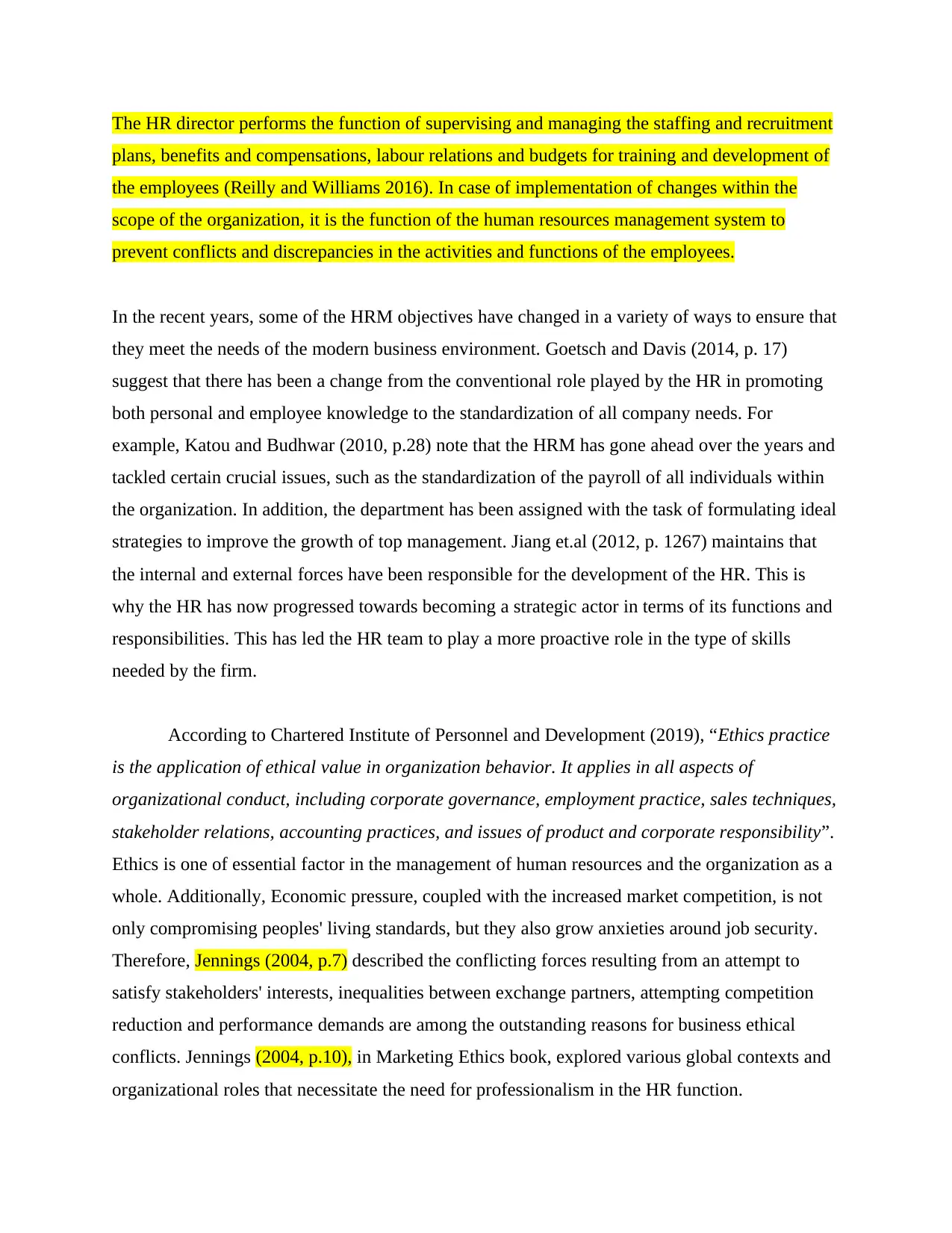
The HR director performs the function of supervising and managing the staffing and recruitment
plans, benefits and compensations, labour relations and budgets for training and development of
the employees (Reilly and Williams 2016). In case of implementation of changes within the
scope of the organization, it is the function of the human resources management system to
prevent conflicts and discrepancies in the activities and functions of the employees.
In the recent years, some of the HRM objectives have changed in a variety of ways to ensure that
they meet the needs of the modern business environment. Goetsch and Davis (2014, p. 17)
suggest that there has been a change from the conventional role played by the HR in promoting
both personal and employee knowledge to the standardization of all company needs. For
example, Katou and Budhwar (2010, p.28) note that the HRM has gone ahead over the years and
tackled certain crucial issues, such as the standardization of the payroll of all individuals within
the organization. In addition, the department has been assigned with the task of formulating ideal
strategies to improve the growth of top management. Jiang et.al (2012, p. 1267) maintains that
the internal and external forces have been responsible for the development of the HR. This is
why the HR has now progressed towards becoming a strategic actor in terms of its functions and
responsibilities. This has led the HR team to play a more proactive role in the type of skills
needed by the firm.
According to Chartered Institute of Personnel and Development (2019), “Ethics practice
is the application of ethical value in organization behavior. It applies in all aspects of
organizational conduct, including corporate governance, employment practice, sales techniques,
stakeholder relations, accounting practices, and issues of product and corporate responsibility”.
Ethics is one of essential factor in the management of human resources and the organization as a
whole. Additionally, Economic pressure, coupled with the increased market competition, is not
only compromising peoples' living standards, but they also grow anxieties around job security.
Therefore, Jennings (2004, p.7) described the conflicting forces resulting from an attempt to
satisfy stakeholders' interests, inequalities between exchange partners, attempting competition
reduction and performance demands are among the outstanding reasons for business ethical
conflicts. Jennings (2004, p.10), in Marketing Ethics book, explored various global contexts and
organizational roles that necessitate the need for professionalism in the HR function.
plans, benefits and compensations, labour relations and budgets for training and development of
the employees (Reilly and Williams 2016). In case of implementation of changes within the
scope of the organization, it is the function of the human resources management system to
prevent conflicts and discrepancies in the activities and functions of the employees.
In the recent years, some of the HRM objectives have changed in a variety of ways to ensure that
they meet the needs of the modern business environment. Goetsch and Davis (2014, p. 17)
suggest that there has been a change from the conventional role played by the HR in promoting
both personal and employee knowledge to the standardization of all company needs. For
example, Katou and Budhwar (2010, p.28) note that the HRM has gone ahead over the years and
tackled certain crucial issues, such as the standardization of the payroll of all individuals within
the organization. In addition, the department has been assigned with the task of formulating ideal
strategies to improve the growth of top management. Jiang et.al (2012, p. 1267) maintains that
the internal and external forces have been responsible for the development of the HR. This is
why the HR has now progressed towards becoming a strategic actor in terms of its functions and
responsibilities. This has led the HR team to play a more proactive role in the type of skills
needed by the firm.
According to Chartered Institute of Personnel and Development (2019), “Ethics practice
is the application of ethical value in organization behavior. It applies in all aspects of
organizational conduct, including corporate governance, employment practice, sales techniques,
stakeholder relations, accounting practices, and issues of product and corporate responsibility”.
Ethics is one of essential factor in the management of human resources and the organization as a
whole. Additionally, Economic pressure, coupled with the increased market competition, is not
only compromising peoples' living standards, but they also grow anxieties around job security.
Therefore, Jennings (2004, p.7) described the conflicting forces resulting from an attempt to
satisfy stakeholders' interests, inequalities between exchange partners, attempting competition
reduction and performance demands are among the outstanding reasons for business ethical
conflicts. Jennings (2004, p.10), in Marketing Ethics book, explored various global contexts and
organizational roles that necessitate the need for professionalism in the HR function.
Paraphrase This Document
Need a fresh take? Get an instant paraphrase of this document with our AI Paraphraser
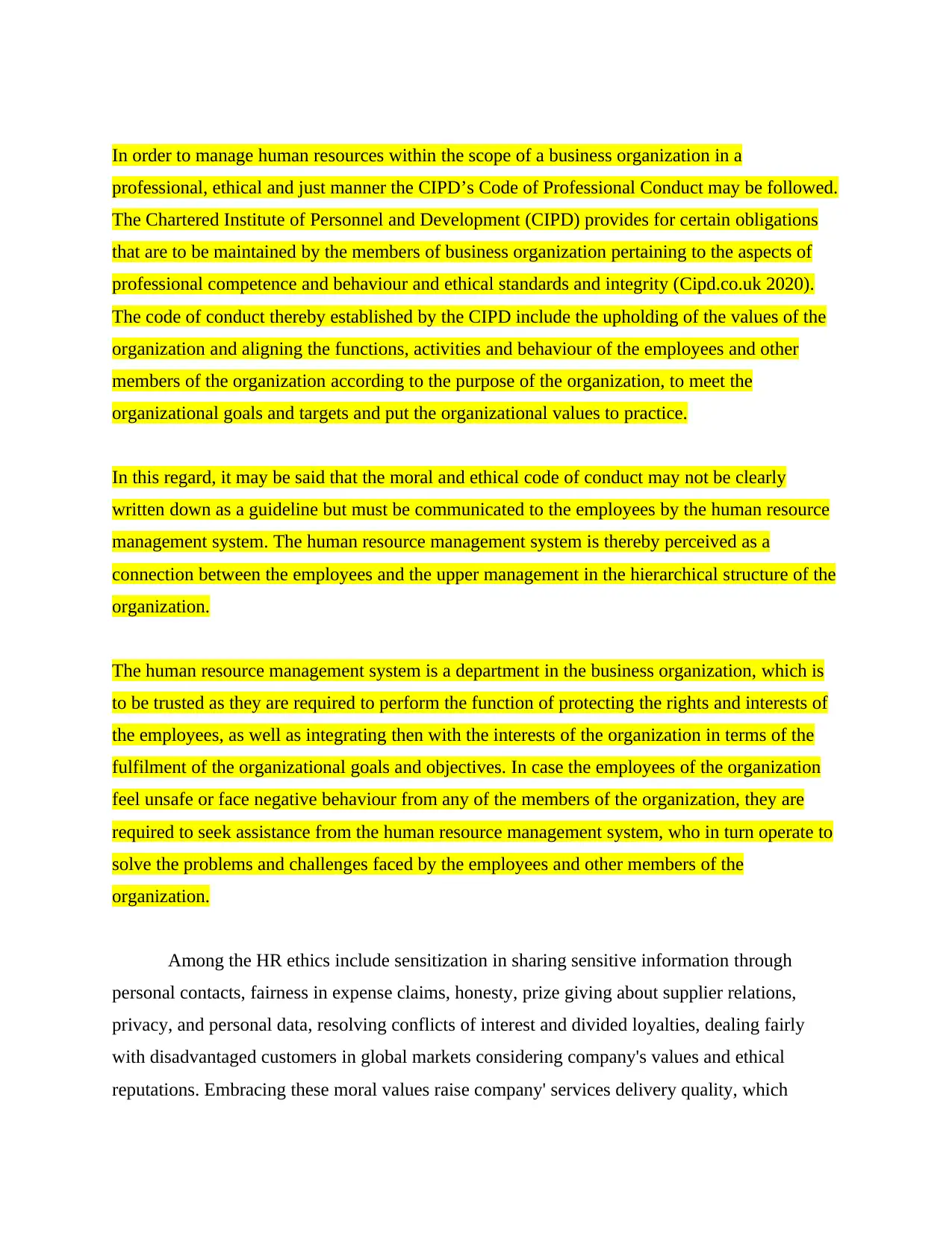
In order to manage human resources within the scope of a business organization in a
professional, ethical and just manner the CIPD’s Code of Professional Conduct may be followed.
The Chartered Institute of Personnel and Development (CIPD) provides for certain obligations
that are to be maintained by the members of business organization pertaining to the aspects of
professional competence and behaviour and ethical standards and integrity (Cipd.co.uk 2020).
The code of conduct thereby established by the CIPD include the upholding of the values of the
organization and aligning the functions, activities and behaviour of the employees and other
members of the organization according to the purpose of the organization, to meet the
organizational goals and targets and put the organizational values to practice.
In this regard, it may be said that the moral and ethical code of conduct may not be clearly
written down as a guideline but must be communicated to the employees by the human resource
management system. The human resource management system is thereby perceived as a
connection between the employees and the upper management in the hierarchical structure of the
organization.
The human resource management system is a department in the business organization, which is
to be trusted as they are required to perform the function of protecting the rights and interests of
the employees, as well as integrating then with the interests of the organization in terms of the
fulfilment of the organizational goals and objectives. In case the employees of the organization
feel unsafe or face negative behaviour from any of the members of the organization, they are
required to seek assistance from the human resource management system, who in turn operate to
solve the problems and challenges faced by the employees and other members of the
organization.
Among the HR ethics include sensitization in sharing sensitive information through
personal contacts, fairness in expense claims, honesty, prize giving about supplier relations,
privacy, and personal data, resolving conflicts of interest and divided loyalties, dealing fairly
with disadvantaged customers in global markets considering company's values and ethical
reputations. Embracing these moral values raise company' services delivery quality, which
professional, ethical and just manner the CIPD’s Code of Professional Conduct may be followed.
The Chartered Institute of Personnel and Development (CIPD) provides for certain obligations
that are to be maintained by the members of business organization pertaining to the aspects of
professional competence and behaviour and ethical standards and integrity (Cipd.co.uk 2020).
The code of conduct thereby established by the CIPD include the upholding of the values of the
organization and aligning the functions, activities and behaviour of the employees and other
members of the organization according to the purpose of the organization, to meet the
organizational goals and targets and put the organizational values to practice.
In this regard, it may be said that the moral and ethical code of conduct may not be clearly
written down as a guideline but must be communicated to the employees by the human resource
management system. The human resource management system is thereby perceived as a
connection between the employees and the upper management in the hierarchical structure of the
organization.
The human resource management system is a department in the business organization, which is
to be trusted as they are required to perform the function of protecting the rights and interests of
the employees, as well as integrating then with the interests of the organization in terms of the
fulfilment of the organizational goals and objectives. In case the employees of the organization
feel unsafe or face negative behaviour from any of the members of the organization, they are
required to seek assistance from the human resource management system, who in turn operate to
solve the problems and challenges faced by the employees and other members of the
organization.
Among the HR ethics include sensitization in sharing sensitive information through
personal contacts, fairness in expense claims, honesty, prize giving about supplier relations,
privacy, and personal data, resolving conflicts of interest and divided loyalties, dealing fairly
with disadvantaged customers in global markets considering company's values and ethical
reputations. Embracing these moral values raise company' services delivery quality, which
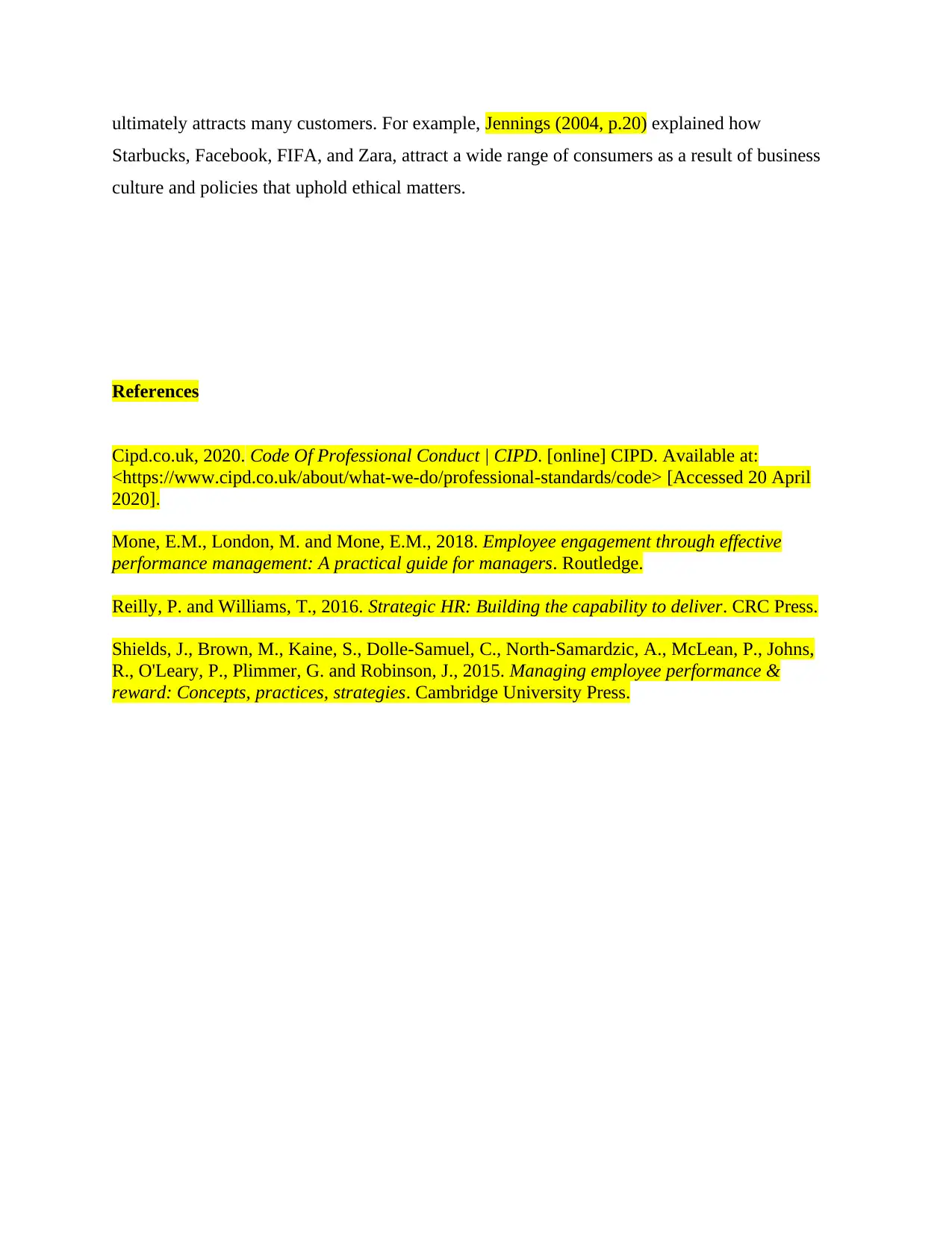
ultimately attracts many customers. For example, Jennings (2004, p.20) explained how
Starbucks, Facebook, FIFA, and Zara, attract a wide range of consumers as a result of business
culture and policies that uphold ethical matters.
References
Cipd.co.uk, 2020. Code Of Professional Conduct | CIPD. [online] CIPD. Available at:
<https://www.cipd.co.uk/about/what-we-do/professional-standards/code> [Accessed 20 April
2020].
Mone, E.M., London, M. and Mone, E.M., 2018. Employee engagement through effective
performance management: A practical guide for managers. Routledge.
Reilly, P. and Williams, T., 2016. Strategic HR: Building the capability to deliver. CRC Press.
Shields, J., Brown, M., Kaine, S., Dolle-Samuel, C., North-Samardzic, A., McLean, P., Johns,
R., O'Leary, P., Plimmer, G. and Robinson, J., 2015. Managing employee performance &
reward: Concepts, practices, strategies. Cambridge University Press.
Starbucks, Facebook, FIFA, and Zara, attract a wide range of consumers as a result of business
culture and policies that uphold ethical matters.
References
Cipd.co.uk, 2020. Code Of Professional Conduct | CIPD. [online] CIPD. Available at:
<https://www.cipd.co.uk/about/what-we-do/professional-standards/code> [Accessed 20 April
2020].
Mone, E.M., London, M. and Mone, E.M., 2018. Employee engagement through effective
performance management: A practical guide for managers. Routledge.
Reilly, P. and Williams, T., 2016. Strategic HR: Building the capability to deliver. CRC Press.
Shields, J., Brown, M., Kaine, S., Dolle-Samuel, C., North-Samardzic, A., McLean, P., Johns,
R., O'Leary, P., Plimmer, G. and Robinson, J., 2015. Managing employee performance &
reward: Concepts, practices, strategies. Cambridge University Press.
⊘ This is a preview!⊘
Do you want full access?
Subscribe today to unlock all pages.

Trusted by 1+ million students worldwide
1 out of 6
Related Documents
Your All-in-One AI-Powered Toolkit for Academic Success.
+13062052269
info@desklib.com
Available 24*7 on WhatsApp / Email
![[object Object]](/_next/static/media/star-bottom.7253800d.svg)
Unlock your academic potential
Copyright © 2020–2026 A2Z Services. All Rights Reserved. Developed and managed by ZUCOL.




